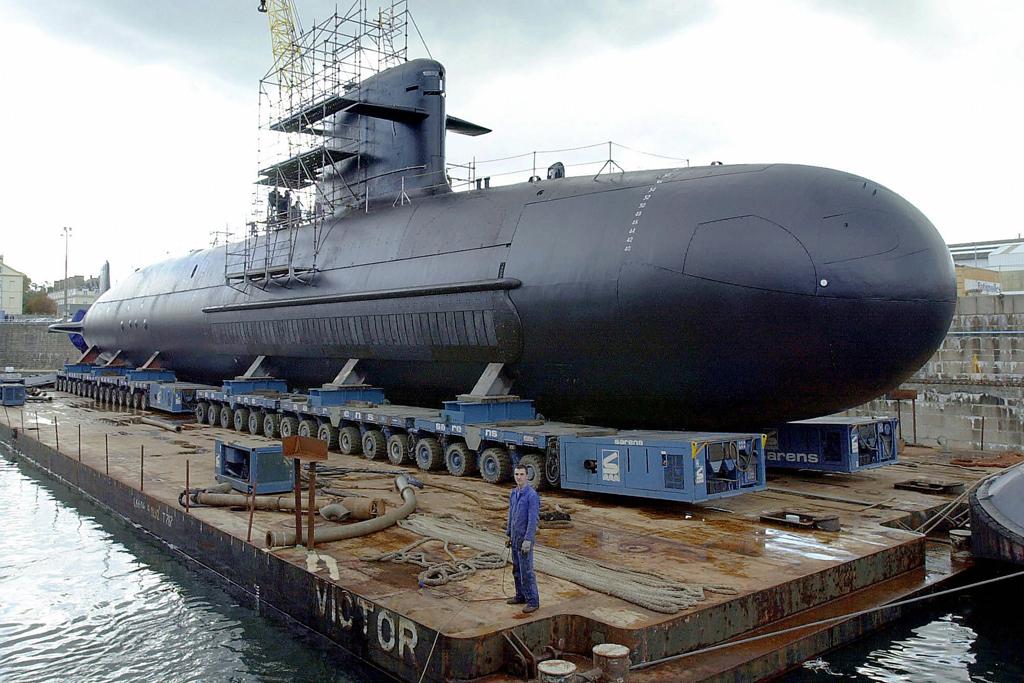Analysis: Brazil goes nuclear
A Scorpene-class diesel submarine at the shipyard in Cherbourg, France, on Oct. 21, 2003.
It’s a British admiral’s nightmare scenario: In the not too distant future, a nearly bankrupt Argentine government invades the oil-rich Falkland Islands. For the second time in half a century, Las Malvinas — the islands all of Latin America regard as a stolen piece of Argentina — spark a war.
With budget cuts, the Brits have no aircraft carrier. Across the Atlantic, Brazil does have one, the Sao Paulo, along with a fleet of nuclear-powered attack submarines being built in partnership with Argentina.
These weapons give Brazil the ability to impose an updated version of the Monroe Doctrine on regional waters. Call it the "Lula Doctrine."
With its new confidence and military ambition, Brazil is a vocal advocate of Argentina’s claim on Las Malvinas. While few can imagine Britain and Brazil ever coming to blows, pieces of that nightmare scenario are starting to take shape.
In 2009, Brazil announced plans to build a fleet of five nuclear attack submarines. Expected to start entering service in 2016, the submarines promise to dramatically alter the balance of power in the South Atlantic. (Currently, only the U.S., China, Russia, India, the U.K. and France operate nuclear-powered warships, the vast majority of them submarines.)
The last time this scenario played out, Britain won the day. Back in 1982, when the Argentine junta led by Gen. Leopoldo Galtieri invaded the islands, Britain mustered a small but powerful fleet of aircraft carriers, submarines and surface ships to support a Royal Marine landing force that retook the islands. The retaking of the Falklands became emblematic of then-Prime Minister Margaret Thatcher’s determination that the once mighty British military not sink to third-class status.
Yet it also left a deep scar on the Latin American psyche. Brazil and other Latin American countries backed Argentina during the war but had little real ability to help militarily. In particular, the region never forgot the single most deadly action of the war, the sinking of the Argentine cruiser General Belgrano, a hulking relic of World War II, by a British nuclear attack submarine, killing 323 sailors.
(GlobalPost in Buenos Aires: Meet the forgotten veterans of the Falkland Islands War)
Until recently, the Falklands conflict was regarded by most experts as unlikely to spark further trouble. But the discovery of oil in the North Falklands Basin in 2007 changed this. Combined with Argentina’s near perpetual state of fiscal distress and Brazil’s new assertiveness on the world stage, sensitivities over the disputed islands have risen.
In January, for instance, Brazil refused a small British warship, HMS Clyde, permission to dock in Rio de Janeiro. Neighboring Uruguay turned away the British destroyer HMS Gloucester in 2010.
In Britain, meanwhile, the commander of the 1982 Falklands fleet, Admiral Sir John Woodward, published an op-ed in June warning that current defense cuts likely would leave the Falklands helpless in the face of a new Argentine invasion, leading to political pressure to reinforce the British garrison.
But Brazil’s submarines change the naval balance of power in the region even more dramatically than Britain’s own defense woes. British strategists worry that Brazil’s may now impose its own version of the U.S. Monroe Doctrine on the region’s waters — in effect, demanding that foreign powers simply steer clear of its backyard as the U.S. did in the 19th and 20th century.
Late last year, Brazil signed a deal with a French defense contractor for help constructing the first of the five boats. This follows a 2008 deal with Argentina to jointly develop the nuclear reactors which will power the vessels.
Brazilian officials have been careful not to portray the subs as a response to any outside threat as they continue to support Argentina’s Malvinas claim in international bodies. Instead, the subs have been characterized as a way to secure the enormous “pre-salt” offshore oil fields discovered by the country over the past several years.
(GlobalPost in Rio: Is Brazil the next elite oil-producing nation?)
President Luiz Inacio “Lula” da Silva, who led the push for the nuclear sub program, said before leaving office that the subs were “a necessity for a country that not only has the maritime coast that we have but also has the petroleum riches that were recently discovered in the deep sea pre-salt layer.”
There is no paywall on the story you just read because a community of dedicated listeners and readers have contributed to keep the global news you rely on free and accessible for all. Will you join the 319 donors who have supported The World so far? From now until Dec. 31, your gift will help us unlock a $67,000 match. Donate today to double your impact!
